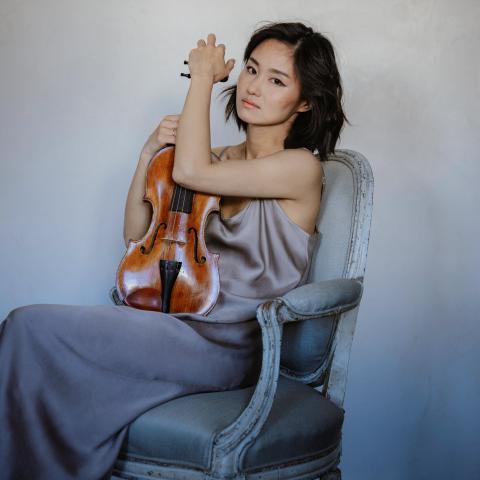Sayaka Shoji
Sayaka Shoji has become internationally recognised for her unique artistic versatility and development of an extensive repertoire. Her remarkable insight into musical languages comes from her mix of European and Japanese backgrounds. Born in Tokyo, Shoji moved to Siena, Italy when she was three. She studied at Accademia Musicale Chigiana and Cologne’s Musikhochschule and made her European debut with Lucerne Festival Strings and Rudolf Baumgartner at the Lucerne Festival and then at the Musikverein, Vienna at the age of fourteen.
Since winning first prize at the Paganini Competition in 1999, Sayaka Shoji has been supported by leading conductors such as Zubin Mehta, Lorin Maazel, Semyon Bychkov, Mariss Jansons and Yuri Temirkanov to name a few. She has also worked with renowned orchestras including the Israel Philharmonic, Philharmonia Orchestra, London Symphony Orchestra, Berlin Philharmonic, Los Angeles and New York Philharmonics, the Orchestra dell’Accademia Nazionale di Santa Cecilia, Czech Philharmonic, Wiener Symphoniker, The Mariinsky Orchestra and NHK Symphony Orchestra
Recent highlights include successful debuts at the BBC Proms with the Royal Philharmonic Orchestra/Vasily Petrenko and the Blossom Festival with the Cleveland Orchestra, a recital tour with Víkingur Ólafsson, a UK tour with Philharmonia Orchestra/Ashkenazy, as well as Bernstein’s 100th gala at Vienna Musikverein with Tonkünstler-Orchester/Sado which was recorded and released by Tonkünstler label.



To take part in the Premio Paganini: this was my dream since, at the age of 12, I was awarded with the first prize at the Students'Contest in Japan. I was really surprised when I was admitted to the final trial and, sincerely, I would never have imagined I was the winner. During my stay in Genoa, I particularly appreciated the art treasures of this city, the good cooking and, mainly, the Genoeses' love for music. It was a great honour for me to be the winner of Premio Paganini and I would like to take this occasion to thank once more Maestro Paolo Peloso, conductor of the orchestra who accompanied me in the two concerts performed in the final trial, the Secretariat and the Genoese audience who supported me with warmth and passion.